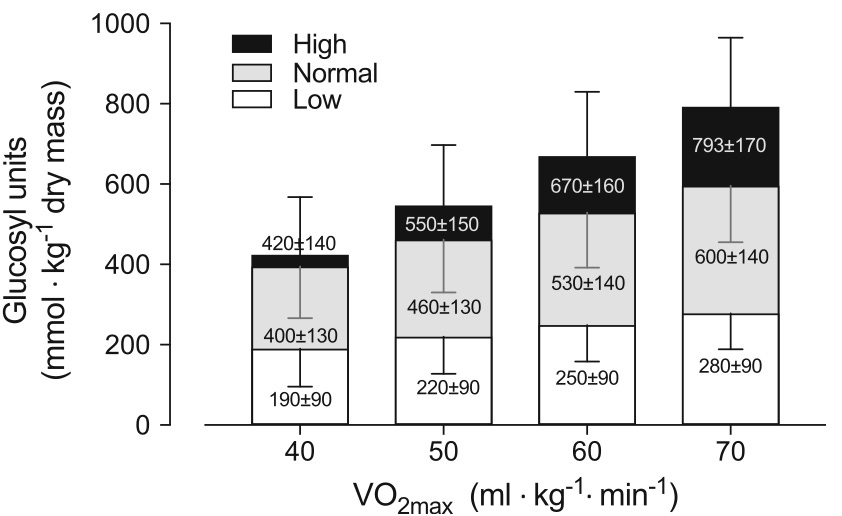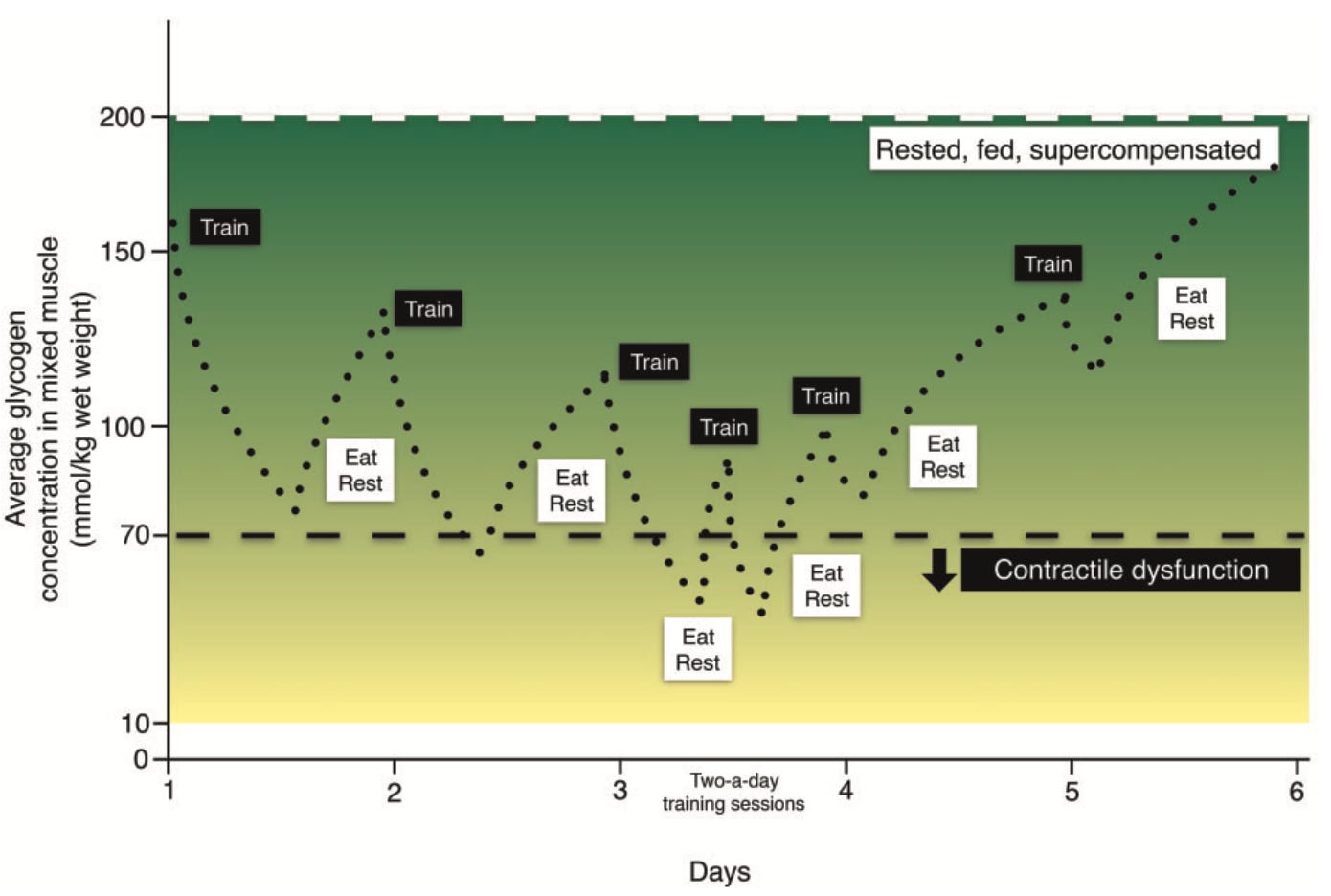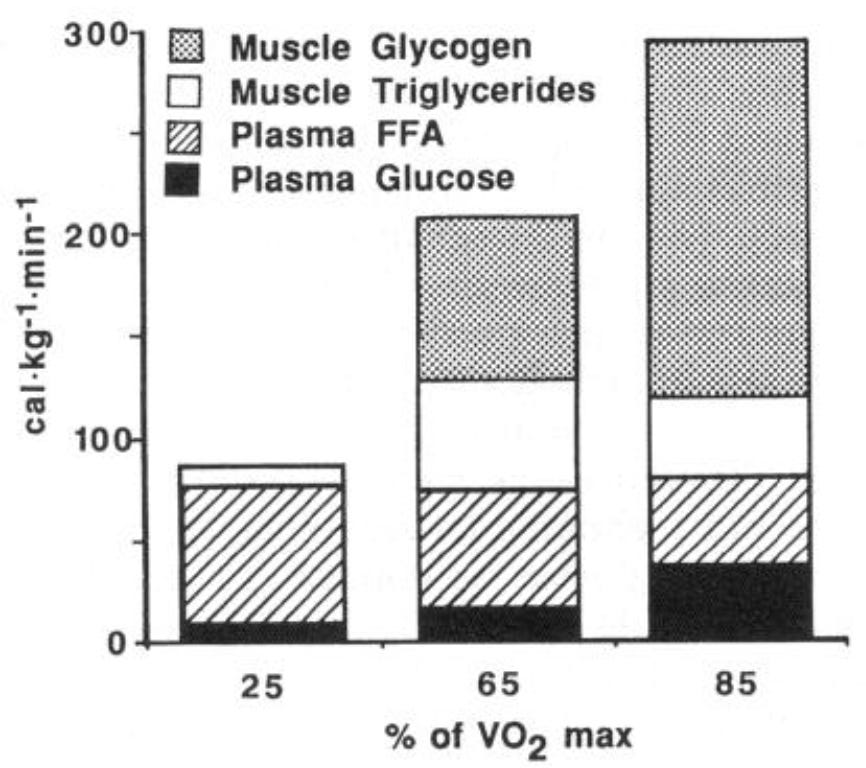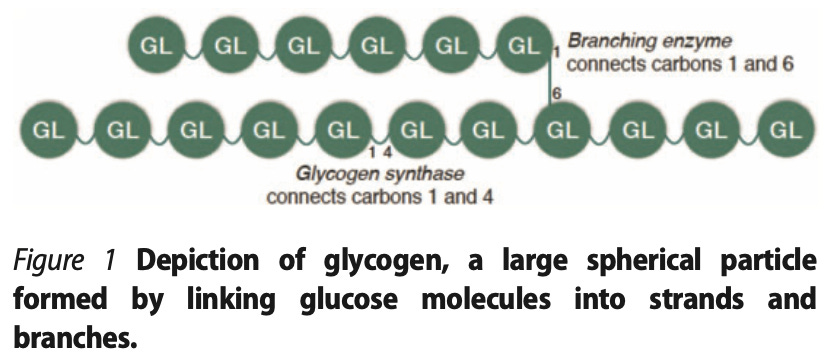When is it necessary to consume carbs during running?
The answer is not often - it all depends on the distance, not the time
Have you ever seen someone on the start line for a 10k or a half marathon packing carbohydrate gels in their pockets? Unfortunately it’s not doing what they think it is.
While overall carbohydrate intake is critical for any sport involving an endurance component, in-race nutrition in sports like running is really only effective above a certain distance.
The fact is the majority of people (myself included, and I train a lot) rarely exercise hard enough for long enough for carb intake during exercise to make a difference.
First, Why Carbs Matter in General
We favor carb burning at exercise intensities above ~60% VO2max. Unless you’re pretty fit, even relatively easy running will involve mainly carb burning.
Based on my experience, 60% is about 11:00/mile running pace in the average person. The more fit you get, you can rely more on fat at higher intensities, but no matter what there is a certain intensity level that crosses into carb-dominance.
Side note: just because we rely more on fat burning at low intensities does not mean we lose more fat, because for a given duration we burn more total calories at a higher intensity.
The reason we have this fat-carb crossover is because fat requires a slow burn in our cells, but carbohydrate energy is fast. It’s like throwing a log versus paper into a fire. Waiting around for fat to be burned when you’re pushing a hard effort hampers performance. Carbs are also more efficient at high intensities, and give you more energy for a given amount of oxygen you take in.
We keep carbohydrate tucked away directly in our muscle (glycogen) while fat is kept in adipose (fat) tissue. So carbs are easier access (we do keep a little fat in our muscles too). On average, we have about 500 grams of muscle glycogen at rest (2,000 calories), with a range of 300-700. Glycogen is individual glucose molecules packed together.

Think of a plane of paratroopers as glycogen, and each individual soldier as a glucose molecule. When each soldier jumps they are mobilized. During exercise we mobilize glucose molecules from glycogen to produce energy.
If our muscle glycogen gets too low, performance takes a hit because we have less available energy for forceful muscle contractions. It never hits zero because we don’t have access to all of it (we don’t use 100% of our muscle mass during exercise). Different muscles (calf versus quad) and muscle fiber types (fast versus slow twitch) also use glycogen in different ways.

A recent study found that if you don’t eat enough carbs after hard exercise, you can’t do as many high-intensity intervals the next morning. For athletes training multiple times a day, almost every day, carb intake is very important. Starting a race with enough carbs on board (in your muscle and liver) is in your best interest (i.e., carb loading). You’ll be hard pressed to find a good runner competing on a keto diet.
How and When Taking Carbs During Exercise Can Help
In addition to muscle glycogen, our blood sugar (free individual glucose molecules) contributes to energy production. The liver stores some glycogen too (about 100 grams) and uses that to pump sugar out into the blood ensuring blood glucose doesn’t fall too low. It can also convert other molecules like lactate into sugar.
It might make sense that if we can use more of that sugar in our blood and keep a steady drip flowing in with gels and sports drinks, we can preserve the glycogen in our muscle. While that has been found before, the consensus from many studies is that muscle glycogen decreases at the same rate whether you have water or a sports drink during exercise.
Even infusing high amounts of glucose directly into the blood to maintain very high blood sugar doesn’t change how much muscle glycogen you use. This is because muscle glycogen is controlled by intracellular signals sensitive to how hard your muscles are contracting, not the glucose available in the blood.

Those mid-race gels do preserve liver glycogen by raising blood sugar and decreasing the burden on the liver to pump out glucose. In fact, carb intake can keep liver glycogen at resting levels if you consume enough.
The biggest performance effects are after a couple hours of exercise. For example, you can push more power/speed at the end of an exercise session, like this study that did 3+ hours of alternating 15 minute high intensity intervals. It also gives you a higher maximal power when you are fatigued (like a final sprint at the end of a long race).
Overall, in-race nutrition is best for hard activity lasting several hours.
As a result, most carb intake guidelines are in terms of time spent exercising. See the chart below from Asker Jeukendrup that is also found on his website mysportscience.com. He’s a legend in sports nutrition and produces great content. Importantly, these recommendations are for those interested in optimal performance and assume you are pushing it quite hard for these durations.
The time-based recommendations are certainly useful, but, I think people fail to realize these guidelines are in the context of well-trained athletes running at a high intensity. Dr. Jeukendrup even mentions that if you are a 5-hour marathoner, you likely don’t need 90 grams per hour because the carbohydrate demand isn’t as high.
Physiologically, the total energy (calories) it costs to run is only dependent on distance, and not speed or time. Whether you run a mile in 6 minutes or 10 minutes, you burn the same amount of calories, you just do it faster or slower.
The Reason Carbs During Exercise is Rarely Necessary For Most People
Muscle glycogen
If I use myself as an example taking into account my leg body composition data (from a DEXA scan), my fitness level (VO2max), and assuming a normal carbohydrate diet, I can store roughly 530g of glycogen in my legs (2,120 calories). If you’re curious how I calculated that, send me a message.
Now let’s take into account the energetic cost of running using research data and a simplified equation from Herman Pontzner’s book Burn:
calories per mile = 0.69 * body mass in pounds
*this is calories above the basal metabolic rateAt 175 pounds I burn ~120 calories per mile and 1,600 calories for a half marathon (120 * 13.1 miles), regardless of my pace. Another equation is 1 calorie per kilogram of body weight per kilometer (1 kcal/kg/km). At my weight (79kg), that’s ~1,700 calories.
Of those ~1,600-1,700 calories, the amount that is carbs versus fat depends on intensity.
Most recreational marathoners run their marathons at 85% of their critical speed (see my article on critical speed here), which ends up being about ~65% VO2max. Half marathon times are usually 4-5% faster, assuming you’re giving an appropriate effort for both, so it might be closer to 70% and upwards of 80% if you’re pretty fit.
The chart below is from one of the first studies I remember having to dissect as a grad student, which details the fuel sources for exercise at different intensities.

At 65% VO2max, muscle glycogen accounts for about 30-40% of the total calories expended. At 85% VO2max it is about two-thirds of total calories expended. Using my VO2max and a recent [flat] 10 mile race performance, I can likely run a half marathon in 75-78 minutes—83% of my VO2max.
So, if I burn 1,600 total calories in the race, roughly two-thirds of that 1,600 comes from muscle glycogen which amounts to ~1,100 calories, about half of what I started with in my legs (2,120 calories). The other 500 or so calories comes from blood sugar and fatty acids.
A recent study predicted that it would take most people 2 hours at 70% VO2max to get muscle glycogen critically low. People run half marathons slower than that for sure, but the intensity is lower which decreases the reliance on muscle glycogen.
So, when we are reasonably well-fed we have enough muscle glycogen on board to power through the half-marathon. It’s also notable that elite runners who can sustain 90%+ of their [very high] VO2max for the half-marathon don’t ingest carbs.
Liver glycogen
Livers are about 4 lb (1.8kg) and store similar glycogen regardless of health/fitness (100g). Since we only have about 20 calories worth of glucose floating in our blood*, the liver has to break down glycogen or create sugar from other sources to prevent hypoglycemia. When liver glycogen depletes by >70% performance is impacted.
*If your blood sugar is 100 mg/dl (milligrams per deciliter), and a typical adult humans blood volume is about 5 liters, the total grams of circulating glucose is about 5. 5 liters = 50 deciliters. 100 x 50 = 5,000 mg or 5 grams. Carbohydrates are 4 calories per gram. 5 x 4 = 20.The rate of liver glycogen breakdown depends on intensity and time (see an overview here), and higher fitness slows the rate breakdown. At a moderate intensity the liver breaks down glycogen at a rate of 0.5 grams per minute or 30 grams per hour. In studies using higher intensities (70% VO2max), liver glycogen decreases by 55% after 80-90 minutes. Both of these values are when you exercise fasted.
For me—running at 83% VO2max for 78 minutes—it’s reasonable to suggest my liver glycogen fall by 50-65% if I didn’t eat breakfast. Consuming carbs before exercise (I did) will mitigate that a bit, but either way I still have enough to support adequate blood sugar levels and avoid any negative effects.
Final Thoughts
If you want to perform at a high level aerobically, carbohydrates are critical. But, for the standard running race distances, carb intake during exercise really only matters for distances above the half marathon assuming you’re reasonably well-fed to start. And don’t get me wrong, it really matters for those longer efforts.
The calorie requirements in running are dependent on distance, not time, and up to the half-marathon we have enough internal fuel storage (muscle and liver) for a successful effort. If you go faster you’ll burn more carbs but also be done sooner, and vice versa.
Two other points. 1) For shorter distances, one way carbs can help is by mouth rinsing—literally swishing Gatorade in your mouth and spitting it out—which may be due to tricking the brain into thinking energy is coming. 2) If you’re prepping for a marathon, be sure to practice consuming carbs during long runs. Running is hard on the gut already, and shocking the system on race day is a gamble that will likely leave you unwell.
Some References
Murray B, Rosenbloom C. Fundamentals of glycogen metabolism for coaches and athletes. Nutr Rev. 2018.
Vigh-Larsen JF, Ørtenblad N, Spriet LL, Overgaard K, Mohr M. Muscle Glycogen Metabolism and High-Intensity Exercise Performance: A Narrative Review. Sports Med. 2021.
Coyle EF, Coggan AR, Hemmert MK, Ivy JL. Muscle glycogen utilization during prolonged strenuous exercise when fed carbohydrate. J Appl Physiol (1985). 1986.
Coggan AR, Coyle EF. Carbohydrate ingestion during prolonged exercise: effects on metabolism and performance. Exerc Sport Sci Rev. 1991;19:1-40.
Jeukendrup A. A step towards personalized sports nutrition: carbohydrate intake during exercise. Sports Med. 2014;44 Suppl 1(Suppl 1):S25-S33. doi:10.1007/s40279-014-0148-z
Areta JL, Hopkins WG. Skeletal Muscle Glycogen Content at Rest and During Endurance Exercise in Humans: A Meta-Analysis. Sports Med. 2018
Rapoport BI. Metabolic factors limiting performance in marathon runners. PLoS Comput Biol. 2010
Rollo I, Gonzalez JT, Fuchs CJ, van Loon LJC, Williams C. Primary, Secondary, and Tertiary Effects of Carbohydrate Ingestion During Exercise [published correction appears in Sports Med. 2021
Sean Langan has his PhD in exercise physiology and currently works as a research physiologist. He is interested in endurance and strength training, and harnessing the intersection of human physiology, technology, research, and coaching to improve human performance. Sean writes about various topics specific to his personal interests and observations, but if there is anything specific you would like to see please contact him.





